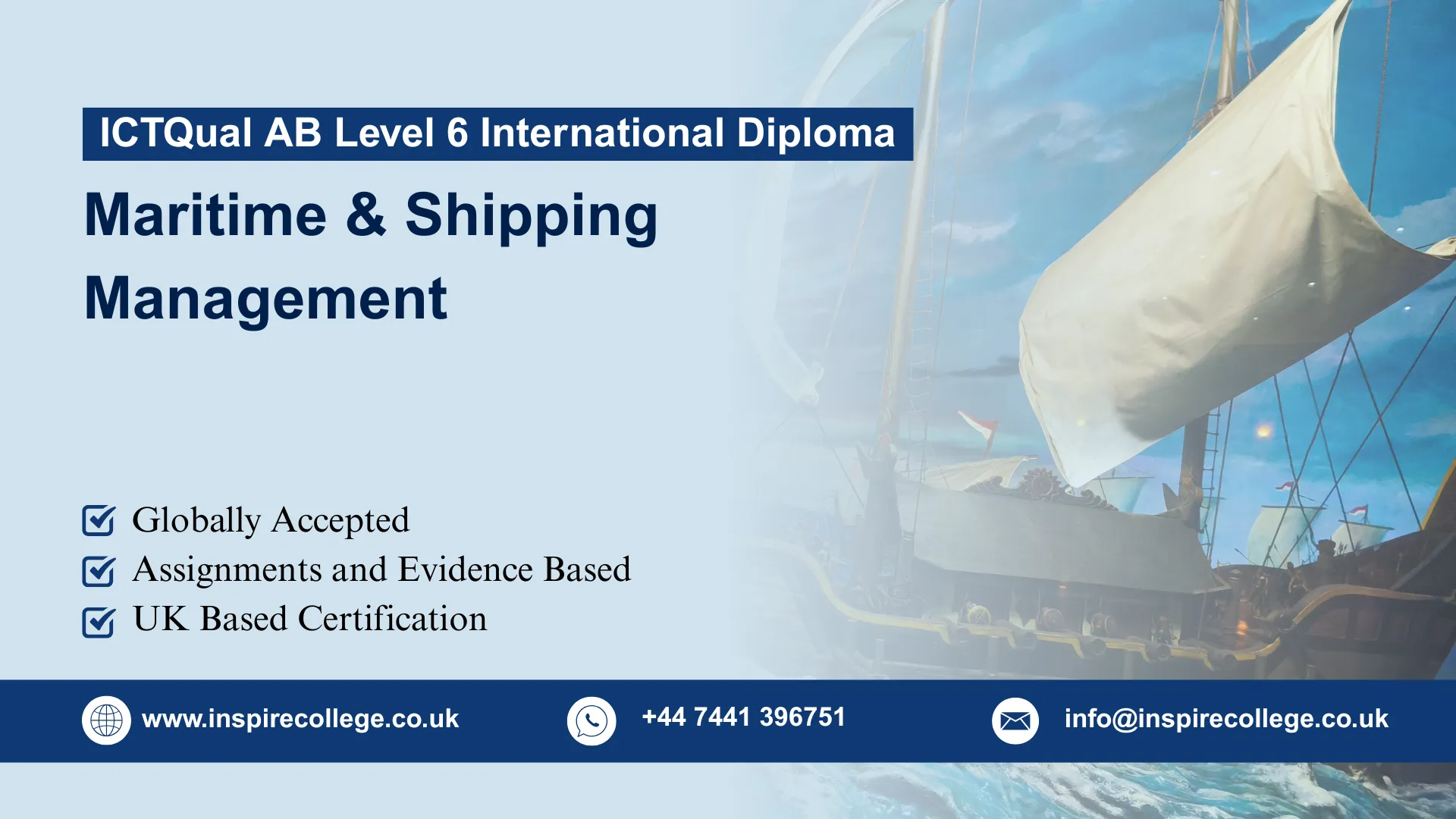
ICTQual AB Level 6 International Diploma in Maritime & Shipping Management
The ICTQual AB Level 6 International Diploma in Maritime & Shipping Management is a globally recognised qualification designed for professionals and aspiring learners seeking advanced expertise in the maritime and shipping sector. This three-year, 360-credit programme equips learners with the operational, managerial, and strategic skills required to excel in global shipping, port operations, logistics, and maritime trade.
The programme offers a comprehensive curriculum that combines theoretical knowledge with practical application, covering key areas such as vessel operations, maritime logistics, port and terminal management, shipping law, environmental sustainability, and emerging maritime technologies. Learners will gain insight into global shipping regulations, risk management, financial management, and strategic decision-making, preparing them for leadership roles in an international maritime environment.
Ideal for both fresh graduates and experienced maritime professionals, the diploma enables learners to develop critical thinking, problem-solving, and leadership skills necessary for effective management of shipping operations and maritime organisations. Graduates can pursue careers as ship managers, port operations managers, maritime logistics coordinators, compliance officers, or shipping consultants.
By enrolling with our ICTQual AB Approved Training Centre, learners gain access to internationally recognised credentials, industry-relevant learning materials, and expert guidance throughout the programme. Completion of this diploma enhances career prospects not only in Pakistan but also across the global maritime and shipping industry.
Prepare to advance your career, master maritime management practices, and contribute to efficient, safe, and sustainable shipping operations with the ICTQual AB Level 6 International Diploma in Maritime & Shipping Management – a qualification designed to meet the evolving demands of the international maritime sector.
To enrol in the ICTQual AB Level 6 International Diploma in Maritime & Shipping Management, learners must meet the following criteria:
- Age Requirement: Learners must be at least 18 years old.
- Educational Background:
- A relevant Level 5 qualification in maritime studies, logistics, shipping, or a related field is preferred.
- Fresh learners with strong secondary or vocational education in technical, business, or maritime-related studies are also eligible.
- Professional Experience:
- For experienced learners, a minimum of 3–5 years of verifiable professional experience in shipping operations, port management, maritime logistics, or related roles is advantageous.
- Experience in vessel operations, maritime compliance, or port logistics supports fast-tracked learning options.
- Language Proficiency: Learners must have proficiency in English to engage effectively with course materials, assessments, and assignments.
- Computer Literacy: Basic computer skills, including familiarity with MS Office, data analysis software, and digital learning platforms, are required.
- Commitment to Learning: Learners must be dedicated to completing the three-year, 360-credit programme, including theoretical modules, practical assessments, and research projects.
These entry requirements ensure learners are prepared to succeed in both academic and practical aspects of maritime and shipping management, equipping them with the knowledge and skills to advance in national and international maritime industries.
Mandatory Units
This qualification, the ICTQual AB Level 6 International Diploma in Maritime & Shipping Management, consists of 36 mandatory units.
Year 1 – Foundations of Maritime & Shipping Management
- Introduction to Maritime & Shipping Industry
- Principles of Shipping Operations
- International Trade and Logistics Fundamentals
- Maritime Law and Regulatory Frameworks
- Port Operations and Management Basics
- Ship Types, Classification, and Vessel Management
- Maritime Safety and Security Principles
- Environmental Sustainability in Shipping
- Supply Chain and Transport Management
- Principles of Risk Management in Maritime Operations
- Introduction to Maritime Economics
- Professional Ethics and Communication in Shipping
Year 2 – Applied Maritime Operations & Management
- Advanced Shipping Operations and Planning
- Vessel Chartering and Freight Management
- Maritime Logistics and Supply Chain Integration
- Port Management and Terminal Operations
- Maritime Insurance and Risk Mitigation
- Crisis Management and Emergency Response in Shipping
- Shipping Finance and Budgeting
- Environmental Compliance and Marine Pollution Control
- Technology and Digitalisation in Maritime Industry
- Project Management in Maritime Operations
- Human Resource Management in Shipping Organisations
- Applied Case Studies and Operational Simulations
Year 3 – Strategic Leadership & Advanced Maritime Management
- Strategic Management in Maritime & Shipping Industry
- International Maritime Policies and Governance
- Maritime Trade Law and Contract Management
- Leadership and Decision-Making in Shipping Operations
- Advanced Risk and Safety Management in Maritime Sector
- Port and Terminal Strategic Planning
- Global Supply Chain Management for Maritime Trade
- Innovation and Emerging Technologies in Shipping
- Sustainability and Climate Change Adaptation in Shipping
- Research Methods for Maritime Management
- Independent Research Project in Maritime & Shipping Management
- Capstone Project: Applied Maritime & Shipping Strategy
Learning Outcomes for the ICTQual AB Level 6 International Diploma in Maritime & Shipping Management 360 Credits – Three Years:
Year 1 – Foundations of Maritime & Shipping Management
Introduction to Maritime & Shipping Industry
- Understand the structure, scope, and functions of the global maritime and shipping sectors.
- Analyse the roles of key stakeholders in shipping operations and port management.
- Identify emerging trends and challenges in maritime trade and transport.
- Evaluate the economic and societal significance of the maritime industry.
Principles of Shipping Operations
- Explain fundamental principles of shipping operations for cargo and passenger vessels.
- Analyse operational workflows, vessel scheduling, and voyage planning.
- Apply efficiency and optimisation techniques in shipping operations.
- Evaluate operational performance against industry standards.
International Trade and Logistics Fundamentals
- Understand principles of international trade, transport, and logistics in maritime contexts.
- Analyse supply chain integration between shipping, ports, and inland transport.
- Apply logistics strategies to optimise freight movement.
- Evaluate the impact of global trade policies on shipping operations.
Maritime Law and Regulatory Frameworks
- Understand national and international maritime laws, conventions, and regulations.
- Apply legal principles to shipping operations, vessel management, and port activities.
- Evaluate compliance strategies to mitigate legal and operational risks.
- Identify implications of non-compliance for safety, security, and operational efficiency.
Port Operations and Management Basics
- Understand the roles, functions, and management practices of ports and terminals.
- Analyse cargo handling, storage, and throughput processes.
- Apply basic principles of port planning and operations management.
- Evaluate port efficiency and performance metrics.
Ship Types, Classification, and Vessel Management
- Identify different ship types and their operational characteristics.
- Understand classification societies, vessel certification, and regulatory requirements.
- Apply knowledge of vessel management for safe and efficient operations.
- Evaluate performance and maintenance requirements for different vessel types.
Maritime Safety and Security Principles
- Identify hazards and security risks in maritime operations.
- Apply safety management and risk mitigation strategies on board and in ports.
- Develop contingency and emergency response procedures.
- Evaluate the effectiveness of maritime safety and security protocols.
Environmental Sustainability in Shipping
- Understand environmental impacts of shipping and port operations.
- Apply sustainable shipping practices and technologies to reduce emissions and pollution.
- Analyse strategies for compliance with international environmental regulations.
- Evaluate the effectiveness of green initiatives in maritime operations.
Supply Chain and Transport Management
- Understand supply chain principles as applied to maritime logistics.
- Analyse integration of shipping with freight, port, and land transport networks.
- Apply operational strategies to enhance efficiency and reliability.
- Evaluate performance metrics for supply chain optimisation in maritime trade.
Principles of Risk Management in Maritime Operations
- Identify operational, financial, and strategic risks in shipping and port management.
- Apply risk assessment frameworks and mitigation strategies.
- Develop risk management plans for routine and emergency scenarios.
- Monitor and evaluate the effectiveness of risk controls.
Introduction to Maritime Economics
- Understand economic principles influencing shipping demand, supply, and freight rates.
- Analyse market trends and economic factors affecting the maritime industry.
- Apply cost-benefit analysis to shipping operations and strategic decisions.
- Evaluate financial performance and operational profitability.
Professional Ethics and Communication in Shipping
- Demonstrate effective written and verbal communication in maritime contexts.
- Apply ethical principles to decision-making, stakeholder engagement, and operations.
- Develop negotiation, presentation, and reporting skills for shipping management.
- Analyse ethical dilemmas and propose responsible solutions.
Year 2 – Applied Maritime Operations & Management
Advanced Shipping Operations and Planning
- Develop detailed operational plans for cargo and passenger shipping.
- Apply voyage planning, fleet scheduling, and resource allocation techniques.
- Analyse operational challenges and implement effective solutions.
- Evaluate operational efficiency against industry benchmarks.
Vessel Chartering and Freight Management
- Understand principles of vessel chartering, contracts, and freight management.
- Apply strategies to optimise freight rates, vessel utilisation, and scheduling.
- Analyse commercial shipping operations and decision-making.
- Evaluate risk and profitability of chartering and freight contracts.
Maritime Logistics and Supply Chain Integration
- Integrate shipping operations with broader supply chain networks.
- Apply optimisation techniques for cargo handling, storage, and transport.
- Analyse intermodal logistics and freight distribution strategies.
- Evaluate supply chain performance metrics in maritime contexts.
Port Management and Terminal Operations
- Apply advanced port management and terminal operations techniques.
- Analyse cargo throughput, operational efficiency, and service quality.
- Develop strategies for capacity planning and resource allocation.
- Evaluate port performance and identify areas for improvement.
Maritime Insurance and Risk Mitigation
- Understand principles of marine insurance, liability, and risk coverage.
- Apply risk mitigation strategies for vessels, cargo, and port operations.
- Analyse claims, policies, and regulatory requirements.
- Evaluate effectiveness of insurance and risk management strategies.
Crisis Management and Emergency Response in Shipping
- Develop emergency response plans for maritime incidents.
- Apply crisis management techniques to mitigate operational and reputational impact.
- Coordinate resources and personnel during emergencies.
- Evaluate the effectiveness of crisis response strategies and improve protocols.
Shipping Finance and Budgeting
- Understand financial principles relevant to maritime organisations.
- Apply budgeting, cost control, and financial analysis techniques.
- Analyse operational costs, revenue, and profitability metrics.
- Evaluate financial performance and recommend optimisation strategies.
Environmental Compliance and Marine Pollution Control
- Apply environmental laws and regulations for shipping operations.
- Implement measures to control marine pollution and emissions.
- Monitor compliance and evaluate sustainability initiatives.
- Develop strategies to improve environmental performance in maritime operations.
Technology and Digitalisation in Maritime Industry
- Explore digital tools, smart shipping technologies, and data analytics.
- Apply technology to enhance operational efficiency, safety, and decision-making.
- Analyse emerging trends and innovations in the maritime sector.
- Evaluate technology adoption strategies for shipping organisations.
Project Management in Maritime Operations
- Apply project management principles to maritime infrastructure and operational projects.
- Develop schedules, budgets, and resource allocation plans.
- Monitor project execution and address risks and challenges.
- Evaluate project outcomes and performance against objectives.
Human Resource Management in Shipping Organisations
- Apply HR management principles to maritime teams and operations.
- Develop leadership, motivation, and conflict resolution skills.
- Plan training and professional development initiatives.
- Evaluate workforce performance and implement improvement strategies.
Applied Case Studies and Operational Simulations
- Analyse real-world maritime operational scenarios.
- Apply theoretical knowledge to solve practical shipping and port management challenges.
- Develop actionable solutions and evaluate outcomes.
- Present findings professionally to stakeholders.
Year 3 – Strategic Leadership & Advanced Maritime Management
Strategic Management in Maritime & Shipping Industry
- Develop and implement strategic plans for shipping and port organisations.
- Analyse operational, commercial, and organisational challenges.
- Evaluate strategic decisions for operational efficiency, safety, and profitability.
- Recommend improvements for long-term organisational success.
International Maritime Policies and Governance
- Understand governance structures and international maritime conventions.
- Analyse the impact of policies on global shipping operations.
- Apply policy knowledge to operational and strategic decision-making.
- Evaluate compliance with international standards and conventions.
Maritime Trade Law and Contract Management
- Apply legal principles to shipping contracts, chartering, and freight operations.
- Ensure compliance with international maritime law and trade regulations.
- Analyse contractual risks and develop mitigation strategies.
- Evaluate organisational practices for regulatory adherence.
Leadership and Decision-Making in Shipping Operations
- Apply leadership theories in maritime management contexts.
- Make informed decisions in complex operational and strategic scenarios.
- Develop team management and motivational strategies.
- Evaluate outcomes of leadership decisions and implement improvements.
Advanced Risk and Safety Management in Maritime Sector
- Identify and assess strategic and operational risks in shipping and port operations.
- Develop advanced safety and risk management strategies.
- Monitor and evaluate the effectiveness of risk controls.
- Implement continuous improvement initiatives for maritime safety.
Port and Terminal Strategic Planning
- Develop long-term plans for port and terminal development.
- Apply strategic planning techniques for asset utilisation and operational capacity.
- Analyse demand, infrastructure, and sustainability requirements.
- Evaluate the impact of planning decisions on efficiency and profitability.
Global Supply Chain Management for Maritime Trade
- Integrate global supply chain principles with shipping and port operations.
- Analyse intermodal transport, freight networks, and international logistics.
- Develop strategies to enhance efficiency and reduce costs.
- Evaluate performance of integrated supply chain solutions.
Innovation and Emerging Technologies in Shipping
- Explore automation, digitalisation, IoT, and other innovations in maritime operations.
- Apply technology to improve operational efficiency and competitiveness.
- Analyse potential impacts of emerging technologies on shipping processes.
- Recommend innovation strategies to enhance organisational performance.
Sustainability and Climate Change Adaptation in Shipping
- Apply sustainable practices to maritime and port operations.
- Develop strategies to address climate change, emissions, and environmental risks.
- Analyse regulatory requirements and international sustainability frameworks.
- Evaluate initiatives for long-term environmental and operational impact.
Research Methods for Maritime Management
- Apply quantitative and qualitative research techniques to maritime studies.
- Analyse data to support operational or strategic decisions.
- Develop research proposals, structured reports, and professional presentations.
- Demonstrate evidence-based decision-making and critical thinking skills.
Independent Research Project in Maritime & Shipping Management
- Conduct independent research on a maritime or shipping-related topic.
- Apply analytical, problem-solving, and critical thinking skills.
- Evaluate findings and develop practical recommendations.
- Present research outcomes in a structured and professional format.
Capstone Project: Applied Maritime & Shipping Strategy
- Integrate knowledge and skills from previous units into a comprehensive strategic project.
- Solve complex operational or strategic challenges in maritime management.
- Analyse project outcomes and measure impact on organisational performance.
- Present project findings professionally to stakeholders and industry experts.
The programme is designed to cater to a broad spectrum of learners, from fresh entrants to experienced maritime professionals seeking career advancement.
1. Fresh Graduates and Entry-Level Learners
- Individuals aged 18 years or older with an interest in maritime and shipping management.
- Learners who have completed relevant secondary or vocational education in maritime, logistics, transport, or business-related fields.
- Candidates seeking foundational knowledge in shipping operations, port management, maritime law, and logistics.
- Learners motivated to develop practical and analytical skills relevant to real-world maritime operations.
- Individuals aiming for professional roles in shipping companies, port authorities, logistics firms, or maritime consultancy.
2. Early Career Professionals
- Junior officers, shipping coordinators, port operators, or logistics personnel looking to gain advanced knowledge.
- Learners interested in specialising in vessel operations, maritime logistics, digitalisation, or sustainable shipping practices.
- Professionals aiming to enhance career prospects, operational efficiency, and leadership capabilities.
- Learners committed to applying both theoretical knowledge and practical skills in real-world shipping and port management scenarios.
3. Experienced Maritime Professionals
- Individuals with 3–5 years or more of verifiable professional experience in shipping operations, vessel management, or port logistics.
- Professionals seeking to formalise and validate their experience with an internationally recognised Level 6 diploma.
- Learners aspiring to managerial, strategic, or consultancy roles in shipping organisations or port authorities.
- Individuals looking to broaden expertise in maritime law, global trade, sustainability, and emerging shipping technologies.
4. Career Switchers and Maritime Enthusiasts
- Learners from related technical, engineering, or logistics backgrounds seeking to transition into maritime and shipping management.
- Individuals passionate about shipping operations, maritime logistics, or port management, looking for structured, industry-focused training.
- Candidates motivated to combine theoretical knowledge with hands-on practice to achieve professional competence.
Key Attributes of Ideal Learners
- Commitment to completing the three-year, 360-credit programme.
- Strong problem-solving, analytical, and decision-making skills.
- Effective communication and teamwork abilities for collaborative projects and operational environments.
- Willingness to stay updated with emerging maritime technologies, sustainability practices, and international regulations.
- Dedication to maintaining safety, quality, and ethical standards in maritime operations.
As an ICTQual AB Approved Training Centre, we offer learners two flexible pathways to achieve the Level 6 International Diploma in Maritime & Shipping Management. All learners must enrol with our centre to access course materials and assessment guidance.
Route 1 – Experienced Professionals
Designed for learners with 6+ years of verifiable professional experience in maritime operations, shipping management, or related fields. Key features:
- Submission of evidence demonstrating prior work experience, responsibilities, and achievements in vessel operations, port management, logistics, or maritime compliance.
- Evaluation of existing knowledge and skills against the diploma’s learning outcomes by our centre.
- Targeted guidance or additional training provided if gaps are identified.
- Successful verification may lead to diploma certification without completing all 36 assignments, enabling fast-tracked recognition of professional expertise.
Route 2 – Fresh Learners
Designed for learners without prior professional experience in the maritime sector. Key features:
- Completion of the full three-year, 360-credit programme, including all 36 assignments, practical assessments, and case studies.
- Assessments structured to demonstrate both theoretical knowledge and practical application in real-world maritime and shipping management scenarios.
- Upon successful completion, learners are awarded the ICTQual AB Level 6 International Diploma in Maritime & Shipping Management.
Benefits of Both Routes
- Gain a globally recognised, industry-relevant qualification.
- Validate prior professional experience (Route 1) or gain comprehensive expertise in maritime operations, port management, shipping law, and logistics (Route 2).
- Enhance career prospects in operational, managerial, and strategic roles across the international maritime and shipping industry.
Register Now
FAQs for ICTQual AB Level 6 International Diploma in Maritime & Shipping Management






